Greetings! It’s worth noting, after nearly two years, that I’m still not doing full reviews, but making examinations into certain aspects. As always, SPOILERS from here on out.
This week on Rebels, Trails of the Darksaber, it’s the training montage (just, you know, without the montage) episode to turn ordinary Sabine into Queen Sabine via a magic sword. It’s like King Arthur in space. Queen Marthur?
Trope Buster
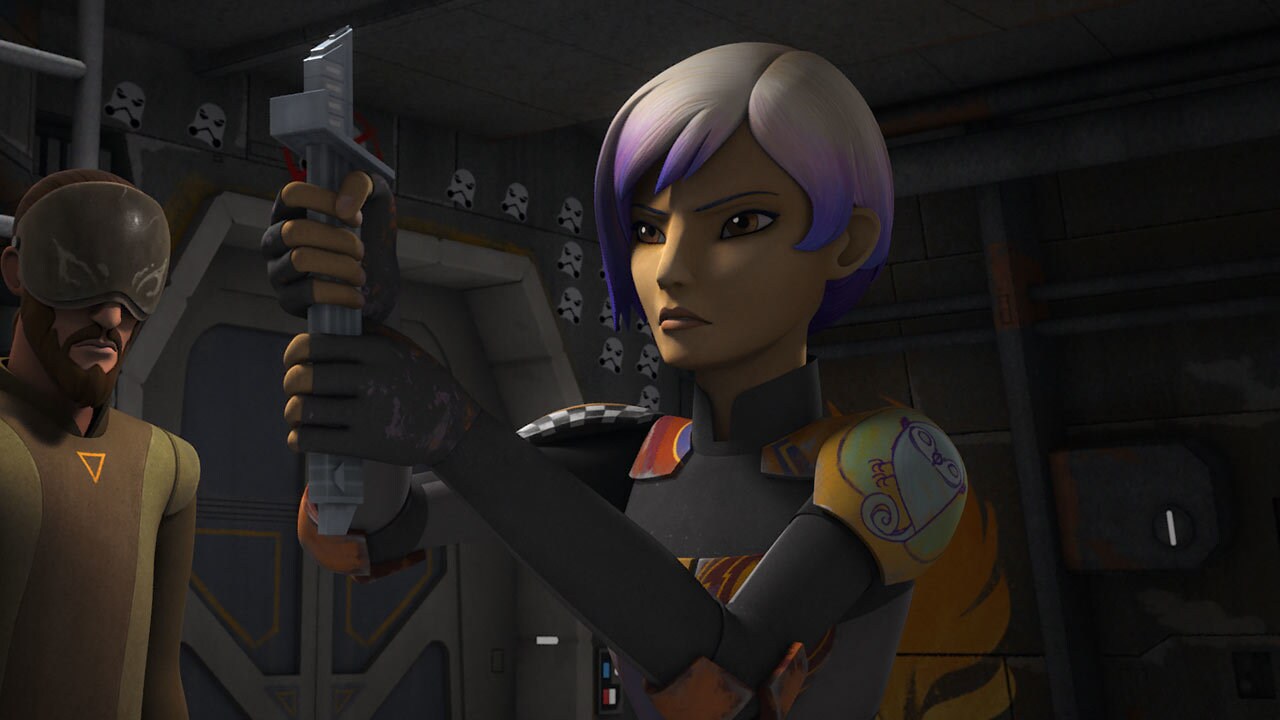
When I first heard about this episode I had some severe reservations, due to how I’m very much not a fan of the sword of destiny type stories, such as King Arthur. I mean, magical swords are a terrible way of picking a leader. What’s its economic policy? Its domestic policy regarding schools? Generally the only foreign policy swords have is to kill foreigners and, well, that’s not a great way to go about this diplomacy business. Okay, I’m somewhat joking while taking the thought to the logical conclusion, but it’s generally accurate to the trope: traditionally, magical sword stories start with the sword picking a good and kind hero to be its leader, and things just tend to work out well because the chosen one turned out to be the best woman for the job after all. Beyond that, though, while the old legends books aren’t canon I still tend to think of Mandalorians of that universe: as a practical people, not one marred by superstition and a belief in fate. So, yeah, I wasn’t looking forward to this.
Thankfully, wonderfully, that’s not what we got at all. What we did get was an almost complete flip of the trope in a very nuanced approach. I generally don’t review the whole episode, but if you don’t mind* I’d like to examine the general structure of the episode.
*I say that like you’re able to stop me typing what I’ve already finished. Unless you manage to invent a time machine, jump into the past and tell me not to write this then you are, but if you’re still reading that implies that, a) you’ve no objection to reading and haven’t closed the tab, as is your right, or b) that you haven’t invented a time machine to travel back in time to stop me writing this. There is another option, c) that you succeeded in inventing a time machine but found a much better use for it, in which case we are already living in an altered reality. However, I think this is unlikely simply because Bananarama still exists.
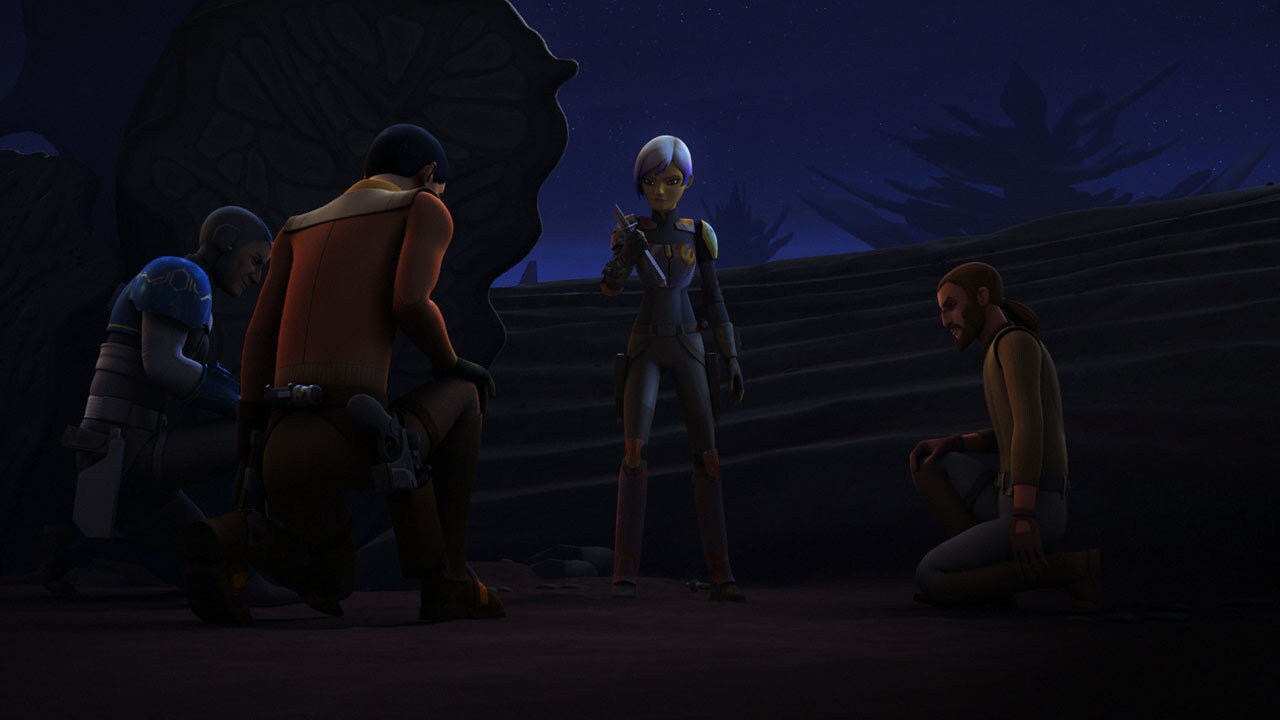
By the very nature of the episode, the trope is subverted – in that I mean Sabine isn’t already found to be capable (though she already was a skilled fighter), but that she must undergo a training regimen to be able to handle the sword in combat. But of course this isn’t the only type of ‘training’ that she undergoes. After all, sword skill, while helpful in winning battles, isn’t all that makes you a good leader. It is the ability to make the tough decisions, to take on the mantle of responsibility that such a job entails. It is the understanding that you serve all and must do your very best for all your people and actively work to do so – and it is that which was her true training in this episode, by her coming to terms with her past.
(As a brief aside, I’m still unable to determine whether or not any of the Ghost crew had this therapeutic training in mind when they first started. I think perhaps Hera knew Sabine needed to come to terms with her past in order to confront her future, but I also think that Kanan had no idea that Sabine needed that psychological stability, since he seemed too focused on training her in combat. But again, I’m still unsure of this.)
In so training, Sabine isn’t letting the magic sword do all the work for her, but is in essence learning to become worthy of it – or rather, worthy of the symbol that means so much to others. For such a symbol is a sort of self-fulfilling prophecy, I should imagine, for many Mandalorians. They’ll follow a sword if they believe in who’s wielding it. ‘We have the sword,’ I imagine these not actually real people saying, ‘everything’s going to be all right because the right sword is in the right hands and the sword’ll do the job for us.’ Never mind that the woman behind the sword has put in countless hours of training, sweat and hard graft in order to become a good leader to her people. It also forgets the numerous people who do believe in the power of magic swords (and consequently are the ones involved in that imaginary conversation above), and who would (I’m assuming at this point) flock to the symbol and they would themselves contribute, sometimes by virtue of simply being there, towards the very goal they wanted the sword to achieve in the first place. And then, in the retelling of it all, they forget (or possibly didn’t realise in the first place) that they had a part to play and then attribute their own success to the magic sword. It’s funny how these things tend to happen.
Back to Basics?
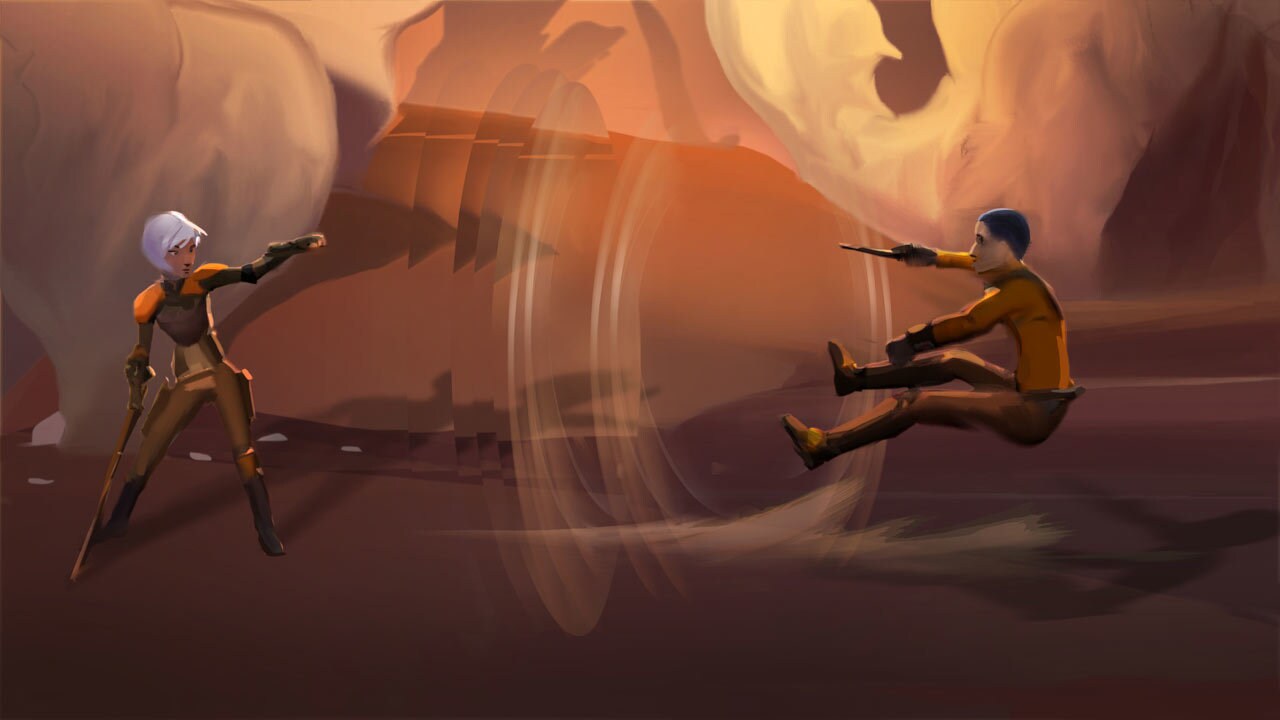
What’s the best way to fight? Sabine and the Mandalorians would have it that an application of gadgetry is the best, while Kanan holds that a simpler way, one where you rely solely on your basic training (and a highly advanced laser sword) is best in order to see you through the day. And indeed Kanan disparages Sabine’s use of her new vambraces, but I think his was the wrong direction to go. Sabine, and seemingly all Mandalorians of the militaristic persuasion, are much more comfortable fighting with this technology than without – and Kanan should recognise that and accept it, not as a flaw but as a positive. Certainly, it could be thought of as a crutch to enable those not quite so skilled warriors in combat, but as Sabine ably demonstrates in this episode, it does require a degree of intelligence and ingenuity to figure out the best tool for the job and to then use it effectively. And not to get too tit-for-tat about it, but don’t let Kanan’s retort of ‘you lost’ fool you into thinking that a reliance on such technology is a bad thing. After all, the Jedi lost, too. To uncivilised weapons, to boot.
Trope Buster II
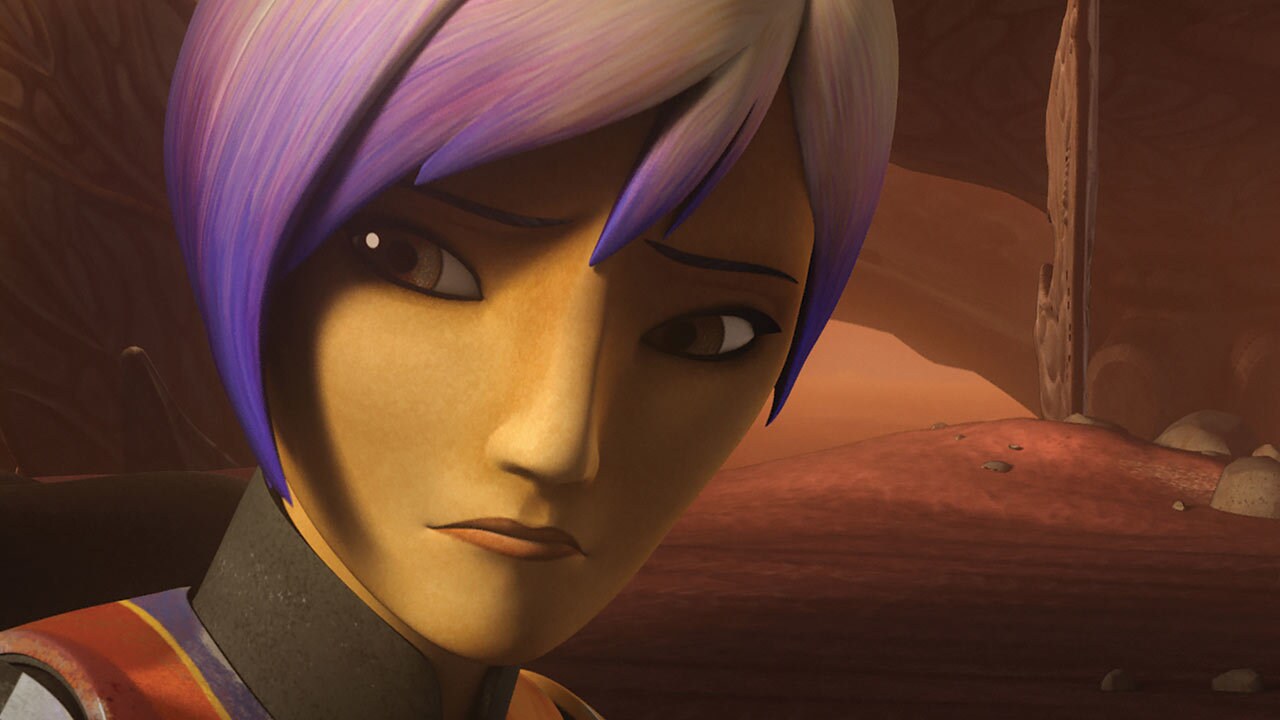
At one point of the episode, Ezra pointedly remarks to Sabine that ‘at least [she has] parents to go back to.’ and it was at this point that I wanted to slap the kid for such a low blow – and a short-sighted one at that. I’ll get to why in a minute, because first I want to compare the two characters. On the one hand, you have Ezra, the small time chosen one, the boy who wins the galactic lottery by being born with supernatural powers and then wins again by finding a tutor to teach him the ways of the Force and become a Jedi. Of course, this lottery analogy stumbles a bit when you remember that his parents, you know, died horribly. But that’s part of the trope, or archetype, which Ezra very much fulfils. Sabine, on the other hand, breaks the mould. She, too, was born to a position of privilege, but it was a position that meant very little at the time and acted as little more than a talking point. Sabine, also, had to fight hard to where she is* in life – but crucially she had no innate upper hand, no gift from the Force to give her a leg up. She has worked hard for her skills. And yes, she has a tragic backstory too. But here she again breaks the mould: usually it is a case of ‘oh no! My parents died! Woe is me!’ or ‘Oh no! my lover died! Woe is me!’ (please note, if your lover or loved ones have died, you have my sincere condolences. I’m not mocking your loss, but rather the tendency of stories to lean on this trope). I’m sure you yourself can think of a number of stories that use this trope – Star Wars alone has done so on more than one occasion.
*Or was. I can never figure out which tense to use when talking about such things.
It’s a common thing for a loved one to die – but that’s not what Fate, and the story tellers, had in store for Sabine. I would argue that it’s a special sort of hell, to have your family be alive, but for you be dead to them. Not simply a case of not being able to get along, like the common story of my American (and Canadian!) friends having to endure a torturous Thanksgiving with relatives that they disagree vehemently with, but rather being disowned by the very people who are supposed to love you and support you no matter what. In Sabine’s story I heard the echoes of the gay son or daughter expelled from the household by their homophobic parents; the atheist or converted child shunned by their extremely religious parents; and those otherwise abused. As such, it became more than just mere trope subversion but something hauntingly real. It also became something of an unreal nightmare. After all, we all lose our parents sooner or later. But how many of us experience outright hatred by those who have birthed us?
Star Wars: Rebels returns in the US on 18th February.
Author: Michael Dare
Michael Dare is a writer, lives in the UK, and has been slowly coming to terms with the realization that he is not Sherlock, but Watson. He loves Star Wars, dislikes blue milk. Enjoys jumping sharks. Survives on the tears of sexist men, and cheeseburgers.
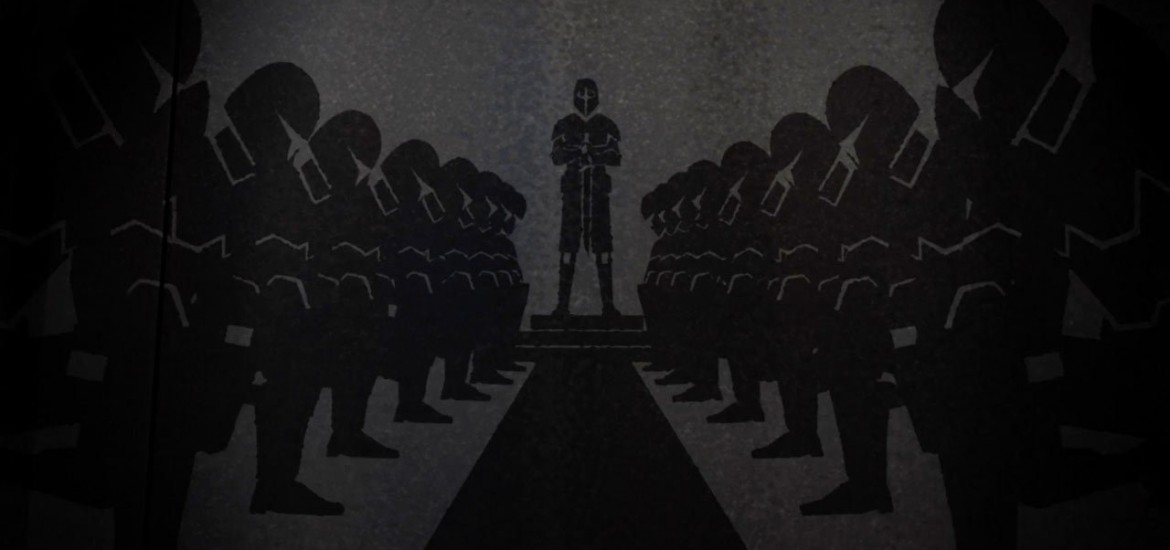
Two things: I think Kanan was clearly aware that Sabine couldn’t achieve her goals without letting go and admitting she had to confront her personal issues: “She can’t find her balance,” he tells Hera. Whatever she chose to do with that self-knowledge, assert leadership, let her past go completely, or just get proficient with the Darksaber; he was simply going to give her the best chance to do any of them without the advocacy Hera was asserting out of necessity.
Second, I think you misread Ezra’s comment. Throughout the episode he is taking a little harmless glee in seeing Sabine have to go through a similar somewhat humbling training regime, but when he goes after her when she storms off, he is trying to reassure her and awkwardly show some support.
His comment about “at least you still have parents to go back to”, isn’t spoken with any snark or petulance.
Instead, Ezra’s just … sad.
He’s not really trying to compare his misfortunes to hers, he’s just disappointed she doesn’t feel there’s any way to reconnect with her still living parents. He’s trying, clumsily, to suggest she still should have hope.
That’ s my take, based on the fact that, a few hours later he’s perfectly willing to sign up to support her in a fight to the DEATH to affirm her position among her Mandalorian peers. And he obviously knows what that means.
Hey Kenneth, thanks for dropping by!
As to your first point, I think perhaps you’re right – it’s just that, for me, there was still uncertainty because he kept on coaching his thoughts in terms of sword training. Because of that I couldn’t be sure one way or the other and couldn’t comfortably say otherwise.
As to the second, I agree and think you’re entirely correct that he wasn’t being snarky or petulant (I had a quick look at what I wrote and don’t think I said that, but if I missed that then I was wrong). And I do think that he was coming from a place of empathy and was trying to help. But the problem is the content – that was simply the wrong thing to say because it minimises Sabine’s very valid problems and feelings. By its very nature it states ‘your pain isn’t as bad as my pain’ – which is not helpful, despite how good and sympathetic a place it comes from.
M